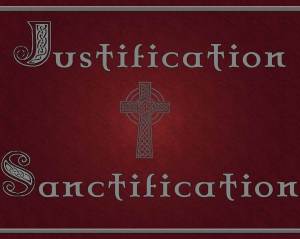Written by Abraham Booth (1734–1806).
Edited for thought and sense by Michael Pursley.
Though justification and sanctification are both of them blessings of grace…
 …and though they are absolutely inseparable, yet they are so manifestly distinct that there is in various respects a wide difference between them.
…and though they are absolutely inseparable, yet they are so manifestly distinct that there is in various respects a wide difference between them.
This distinction may be thus expressed. Justification respects the person in a legal sense, is a single act of grace, and terminates in a relative change; that is, a freedom from punishment, and a right to life. Sanctification regards him in a physical sense, is a continued work of grace, and terminates in a real change, as to the quality both of habits and actions. The former is by a righteousness without us; the latter is by holiness wrought in us. That precedes, as a cause; this follows, as an effect. Justification is by Christ as a priest, and has regard to the guilt of sin; sanctification is by him as a king, and refers to its dominion. The former annuls its damning power. Justification is instantaneous and complete, in all its real subjects; but sanctification is progressive and perfecting by degrees.
The persons on whom the blessing of sanctification is bestowed, are those that are justified, and in a state of acceptance with God.
For concerning them it is written, and it is the language of reigning Grace, I will put my laws into their mind, and write them in their hearts. The blessing here designed, and the favor here promised, is that love to God, and that delight in his law and ways, are implanted in the hearts of all the regenerate, instantly inclining them to obey the whole revealed will of God, so far as they are acquainted with it. Sanctification is a new covenant blessing; and in that gracious constitution it is promised as a choice privilege, not required as an entitling condition.
Those happy souls who possess the invaluable blessing, and are delivered from the dominion of sin, are not under the law; neither seeking justification by it, nor obnoxious to its curse, but under grace; are completely justified by the free favor of God, and live under its powerful influence. This text strongly implies, that all who are under the law, as a covenant, or are seeking acceptance with the eternal Judge by their own duties, are under the dominion of sin; whatever their character may be among men, or however high their pretenses may be to holiness. And as those that are under the law have no holiness, they can perform no acceptable obedience. For they that are in the flesh, in their carnal, unregenerate state, cannot please God. Every one that is under the law, is condemned by it; and while his person is accursed, his duties cannot be accepted.
A man’s person must be accepted with God before his works can be pleasing to him.
————————————————-
Meet the author and part of your Christian heritage: Abraham Booth (1734–1806) was an English dissenting minister and author, known as a Baptist apologetical writer. Booth was baptized in 1755 by immersion, and began to preach in the Midland counties. In 1760, when the Baptists first gathered into churches, Booth became superintendent of the Kirkby Woodhouse congregation, but not their pastor. He changed views, from General Baptist to Particular Baptist, and seceded. Soon after, he began to preach on Sundays at Sutton-in-Ashfield, Chesterfield, and elsewhere in the Midland towns and villages, still keeping his school.
The Particular Baptist church of Little Prescot Street, Goodman’s Fields, in east London, invited Booth to be their pastor. He accepted the call, and was ordained on 16 February 1769. He entered a controversy with Andrew Fuller, over the 1785 book The Gospel Worthy of All Acceptation. In the 1790s Booth preached in the abolitionist cause, and joined the Pennsylvania Abolition Society. The Baptist Education Society was founded around 1804 by Booth and others. It led, in 1810 after his death, to the setting up of Stepney Academy in East London.
Booth died on 27 January 1806, aged 71, having been a minister 50 years. A marble tablet was erected to his memory in the Prescot Street chapel, where he had been pastor 35 years. William Jones‘s Essay on Abraham Booth was published at Liverpool, 1808.
